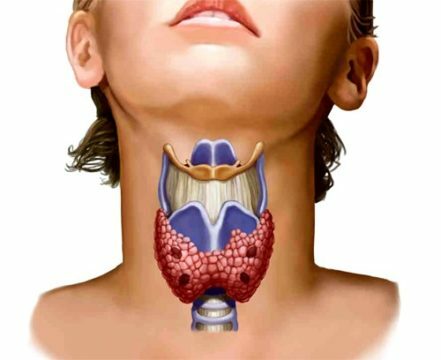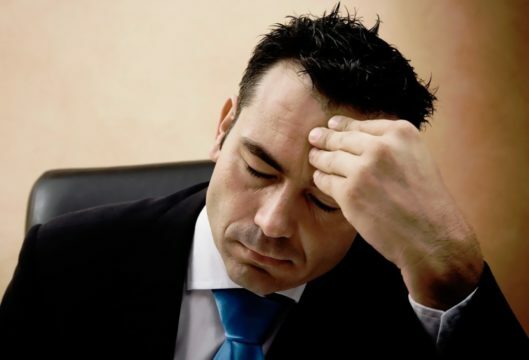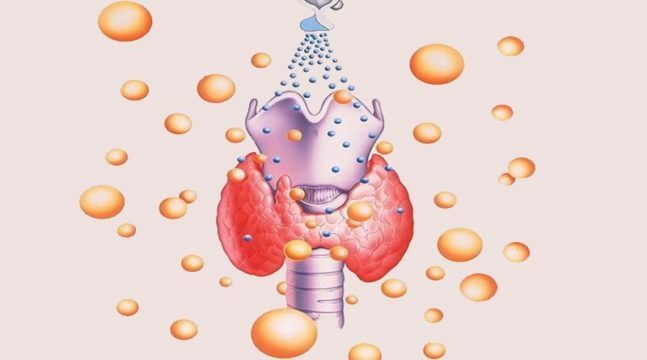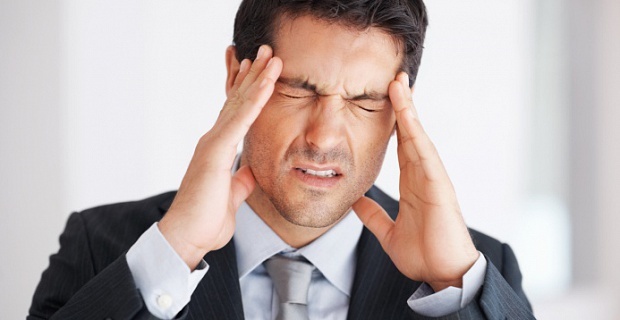The thyroid gland is one of the most important organs of the endocrine system. Her hormones - triiodothyronine( T3) and thyroxine( T4) regulate the basic metabolism in the body, affect the functioning of the nervous, endocrine, reproductive systems. The pituitary synthesizes thyroid-stimulating hormone( TSH), which regulates the secretion of T3 and T4 by the principle of negative feedback - if the level of thyroid hormones in the blood decreases, the level of TSH rises, it stimulates the thyroid gland and the concentration of T3 and T4 returns to normal. With their increase, on the contrary, the production of TSH is reduced, and the activity of the thyroid gland is also reduced.
Functions of thyroxine

Thyroxine is the main thyroid hormone. He and his predecessor triiodothyronine regulate the metabolism in the body. Normally, it maintains body temperature, basal metabolic rate, sensitivity to ambient temperature. He also regulates emotional reactions, the functionality of the reproductive system, both in men and women, appetite, weight gain and reduction, skin, hair and nails condition.
If their level rises, the person becomes more active, emotional, the acceleration of the basal metabolism causes a decrease in body weight, a feeling of heat, the face becomes red with characteristic protruding cheekbones and exophthalmos( bulging eyes).With a decrease - on the contrary, a feeling of cold, excessive weight, slowing down the basal metabolism.
Hypothyroidism
Hypothyroidism is a condition that develops when there is a lack of thyroid hormones in the blood. For reasons of hypothyroidism, the condition is divided into four groups:
- Primary is associated with the pathology of the thyroid gland. The T4 level is low, the TSH is high, and rarely - normal.
- Secondary arises in the pathology of the pituitary gland with a healthy thyroid gland.Т4 and ТТГ are lowered.
- Tertiary is caused by the pathology of the hypothalamus. The level of T4 and TTG is low.
- Peripheral is due to high tissue resistance to thyroid hormones or inactivation of these hormones in the blood. The level of T3 and T4 is normal or low, in some cases can be increased, TSH - can be different.
Symptoms of hypothyroidism.

Regardless of the cause of hypothyroidism, there is a decrease in T4 in the blood. At the same time, there is a decrease in total metabolism, and the following negative changes are observed:
- lethargy, drowsiness, fatigue;
- decreased attention, concentration, memory;
- unmotivated mood swings;
- hair loss, eyelashes, eyebrows;
- weight gain with unchanged diet and physical activity;
- peeling skin, dull hair, brittle nails;
- sensation of cold, cold hands and feet even in a warm room;
- swelling of the face, neck;
- constipation;
- in women - profuse painful menstruation or amenorrhea;
- in men - decreased potency.
Most often, women over forty are affected by hypothyroidism. In different regions, the incidence of primary hypothyroidism is different. In places where there is iodine deficiency in water and soil, the characteristic type of hypothyroidism is endemic goiter, when under conditions of iodine deficiency the thyroid gland is not able to produce a normal amount of hormones.
In peripheral hypothyroidism associated with low sensitivity of tissues to T3 and T4, not all the complex of symptoms can be observed, but only a part of them, sincethe decrease in sensitivity may be uneven.
Changes in the hormonal background

Changes in the concentration of T4 and TSH in the blood depend on the cause of hypothyroidism.
In primary hypothyroidism, when there is a pathology of the thyroid gland( inflammation, fibrosis, tumor, postoperative condition, iodine deficiency, radioactive iodine poisoning, thyroid and thyrotoxic drug intake, congenital anomalies), the level of thyroxine in the blood decreases. The concentration of TSH begins to rise earlier than the level of T4, ie.in the early stages of the disease there will be an elevated TSH at normal T4, at later stages - increased TSH with reduced T4.If an increase in the concentration of thyroid-stimulating hormone does not lead to the normalization of the T4 level, then with time the production of TSH decreases and may again become normal and then decreased for some time. This is a dangerous symptom, indicating an extremely severe course of primary hypothyroidism.
In secondary and tertiary hypothyroidism, there are other changes - due to insufficient function of the pituitary or hypothalamus, the concentration of TSH in the blood decreases. In such conditions, the thyroid gland does not receive sufficient stimulation and produces less thyroid hormones - this is a normal reaction of a healthy thyroid gland to a low level of TSH.
Changes in peripheral hypothyroidism depend on its cause. If it is caused by an increase in the level of estrogens, cortisol or thyroxine-binding globulin( TSH), then the concentration of T3 and T4 will be reduced, while the level of TSH will increase, and the same pattern of hormonal changes is observed, as in primary hypothyroidism. With high tissue resistance to thyroid hormones, T4 and TSH levels can be normal, and individual symptoms of hypothyroidism will be observed. With generalized tissue resistance to T4, which is rare, its blood level is elevated, the level of TSH is lowered.
Low T4 concentration in normal TSH indicates a severe course of primary hypothyroidism, but is more common with an excess of cortisol or estrogens. This condition can be a consequence of taking corticosteroids, oral contraceptives or anti-androgen therapy.
Treatment of hypothyroidism

Treatment of hypothyroidism depends on its cause. If it is peripheral hypothyroidism caused by taking hormonal drugs, then it makes sense to review the appropriateness of their administration. If you cancel these drugs, the level of thyroid-stimulating hormones will return to normal after a while. If you can not stop treatment, then synthetic analogues of thyroid hormones( levothyroxine, eutirox) are prescribed. Patients under the age of 50 years in the absence of pregnancy immediately given a full dose of the drug, in other cases - the dose increases gradually.
With primary hypothyroidism, its cause is eliminated - the pathology of the thyroid gland. For this, medication may be prescribed - preparations of thyroid hormones, preparations of iodine. In case of inflammation, anti-inflammatory drugs( nonsteroidal) are prescribed. With tumors, surgical removal of the tumor is performed. After surgery, the function of the gland may not recover completely, and then there is a need for replacement therapy.
In secondary and tertiary hypothyroidism, replacement therapy is also prescribed and treatment of pituitary or hypothalamic disease is performed.



